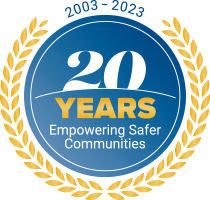Connect 2023
Now Available On Demand

The 4th annual Lexipol Connect virtual conference brought together a diverse spectrum of leaders and subject matter experts addressing topics such as recruitment and staffing, peer support training, personnel wellness, grant writing, legal trends and much more. This year we also celebrated Lexipol’s 20 years of service to public safety.
Ranging from 30 to 60 minutes, the sessions are available for on-demand viewing.
When law enforcement, fire/EMS, corrections and dispatch personnel act egregiously – or just as bad, fail to act – it’s easy to regard these incidents as outliers. But what led these personnel to do the things they did? Is there a mental health connection? What warning signs proceed such incidents, and how do we empower leaders and individuals to identify and address them before tragedy ensues? This session will be a dynamic dialogue on the intersection of risk management, first responder wellness, and effective supervision and administration.

Mike Ranalli

David Black

Jaime Brower

Lois James

Chief Joe Schrage

Gordon Graham
as moderator
The lack of high-quality candidates in law enforcement is a nationwide problem. While some agencies are using big bonuses to attract lateral candidates, that’s a short-term solution at best. Join us for a panel discussion on the state of recruitment in law enforcement. What’s working now, and what isn’t? How should agencies structure the candidate vetting, preparation, and FTO process to ensure retention of the best recruits? We’ll discuss recruitment videos, the 30×30 initiative, how accreditation and wellness are connected to recruitment, and more.

Chief Ken Wallentine

Assistant Chief (Ret.) Jonni Redick

Deputy Chief (Ret.) Jim Dudley

Sergeant Eric Tung
From managing change to navigating the vital role of the company officer to career development and avoiding legal liability, fire and EMS personnel face numerous leadership challenges. In this session, we’ll explore some leadership lessons and principles for navigating a career in fire/EMS.

Deputy Chief Billy Goldfeder

Deputy Chief Curt Varone

Chief John Butler

Operations Chief Amy Hanifan

Ed Sherman, PsyD
Challenges facing the delivery of public safety in today’s world are more complex than ever. While the good acts of good people serving in public safety far outnumber the bad, the bad acts create poor images and consequences that make headlines. When these crises hit, the call for effective, active and ethical leadership is loud and clear. Yet leaders often lack all the answers, creating a crisis of leadership. This presentation will look at current events in EMS, what we are failing to do and what is needed to deliver effective, ethical leadership for the best patient care.

Kevin Brame, EFO
Community engagement is often talked about in law enforcement circles, but it often stays on a theoretical level – something that sounds good but doesn’t translate into practice. In this session, Sgt. (Ret.) Jason Lehman of the community non-profit “Why’d You Stop Me?” will share practical tools officers of every rank can use to improve strategic communication, de-escalate high-stress situations, and forge connections with even the most resistant community members.

Sgt. (Ret.) Jason Lehman
Peer support teams are one of the best ways to help public safety personnel cope with the stresses of the job. But if they’re not properly trained, your agency is at risk. This session will review key areas of training for peer support teams, including confidentiality issues, suicide prevention, moral injury and more. We will also provide information about Lexipol’s new national peer support training program.

Jaime Brower, PsyD

David Black, PhD
The fire service is changing — slower than society as a whole, but surely. The future of the fire service lies in a more diverse firefighter—not just in terms of gender and ethnicity, but in terms of backgrounds, educational levels, body types, and a host of other characteristics. This session will explore ways fire service leaders can cultivate an environment where everyone has a chance for success without undermining performance standards — an environment where fire service culture is preserved even as it evolves to reflect new realities.

Battalion Chief Bruce Bjorge
Join Lexipol’s Legal Team for a quick review on some of the major cases and legislative trends impacting law enforcement agencies in 2023.

Prathi Chowdri
Join Curt Varone for a quick review on some of the major cases and legislative trends impacting fire and EMS departments in 2023.

Deputy Chief Curt Varone
Join Lexipol’s Legal Team for a quick review on some of the major cases and legislative trends impacting corrections agencies in 2023.

Erica Wilson
What really catches a grant reviewer’s eye? Each year, public safety and local government leaders submit countless applications, but only a small fraction make the cut. Why do some applications succeed and others fail? In this session, professionals who have served as grant reviewers and written hundreds of successful applications will share critical elements that can help your application stand out.

Caitlin O’Connor

Stephan Hutchins

Dan Hallowich

Sarah (Wilson) Handler
In communities across the country, residents are demanding an increased focus on gun crimes and other violent criminal activity. But done incorrectly, crime reduction programs destroy police-community relations rather than enhancing them. This session will enhance leaders’ understanding of the issues pertaining to implementing crime reduction strategies. Attendees will learn why clearly defined priorities, goals and objectives will help to guide officers on the street to make legitimate decisions; how emphasizing the priority of life will help to protect officers and members of the public while adhering to legal requirements; and how the concept of legitimacy relates to police policy, tactics, and training.

Chief (Ret.) Mike Ranalli
Most agencies continue to struggle to identify their staffing, and often lack a staffing plan altogether. This process is time-consuming, and most agencies have not collected the needed data to produce the outcome the process proposes. This session will help correctional leaders understand factors that influence staffing and how to get started on developing a staffing plan that works.

Amanda Hassenstab
With federal, state and local pressure building, law enforcement agencies are increasingly expected to demonstate compliance with the highest standards by becoming accredited. This session will provide a short history of accreditation standards in law enforcement, how standards have developed over time in different areas of the county, and the legal implications of the new federal involvement with accreditation standards. Presenters will share strategies to help agencies achieve accreditation and how accreditation standards support safe and responsible policing and reduce legal risk for agencies. A brief overview of Lexipol’s Law Enforcement Accreditation Service will be included.

Erin Robles

Craig Wilsher
Short staffing, recruitment and retention have been some of the greatest challenges that public safety agencies have faced on an ongoing basis. However, there is an untapped solution within every agency’s reach. Join this session to learn how to use wellness to help personnel physically feel their best, do their best, and become valuable force multipliers within your agency. Practical, evidence-proven strategies and turnkey best practices for physical fitness, nutrition, and sleep will be shared. Additionally, recommended resources will include user-friendly tools and technology that will minimize time and manpower needed to maximize employee and agency success.

Mandy Nice
Catch up on everything you need to know about what’s going on at Lexipol. Learn about recently added products and services as well as how Lexipol is addressing evolving issues in public safety – and growing to help you address the challenges facing your agency.

Ankush Grover

Jen McLeod

Ken Robinson

Rob Schneider
As Lexipol celebrates its 20th year of empowering safer communities, we increasingly see patterns across industries, from fire/EMS to law enforcement, corrections, local government, dispatch, legal, healthcare and more. Renowned risk management expert Gordon Graham has studied high-risk professions across the country. Join him for a glimpse at the commonalities in the challenges personnel in these industries face – and the strategies he sees as imperative for reducing risk, preserving life and keeping personnel and communities safe.

